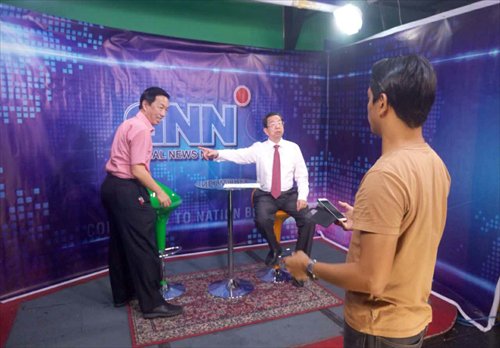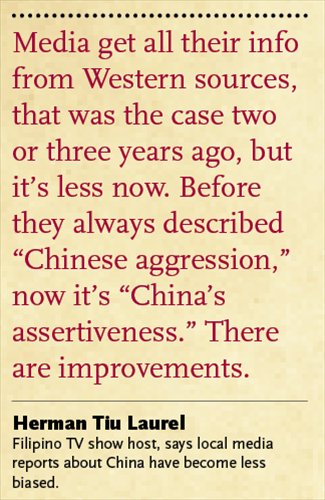Philippine TV show host challenges biased image of China amid sea spat
As tension between China and the Philippines escalates, some journalists are trying to be the bridge between the two countries and help the people understand one another. Analysts say they believe a lot of misinterpretation and inaccurate descriptions are published by the media outlets of each country.

A vendor relaxes next to his newspaper stall. Photo: Li Hao/GT
Every day, Herman Tiu Laurel scans many newspapers and websites from around Asia, looking for items related to China or the South China Sea issue.
Then once a week, he presents the information on his online show.
"My personal mission is to help the Philippines avoid possible conflicts that might arise that are not in the interest of Filipinos, but in the interest of a Western power," he said. He thinks the local media doesn't do a just job when it comes to the portrayal of China; he says there are many sides to the story that are left unreported.
Laurel is a host on the Manila-based Global News Network. His new show is called Journeys: Chronicles of our Asian Century and is broadcast on YouTube. Once a week, he invites speakers to come to his studio and discuss news reports about China and the South China Sea issue.

Herman Tiu Laurel sits in his studio with guest speaker Wilson Lee Flores, telling the cameraman where to stand. Photo: Zhang Yiqian/GT
Guerilla war
In a recent episode, Laurel invited Wilson Lee Flores, a columnist at the Philippine Star, to be a guest on his show.
The show began with Flores giving an account of his recent business trip to China. He described the skyscrapers he saw in Shenzhen, South China's Guangdong Province and talked about the city being a world factory and high-technology hub.
Then a clip of the Nanyang Festival was shown, where a Filipino team of performers traveled to East China's Fujian Province to participate, followed by an interview with a Filipino chef about his life in China.
"Fujian Province is where 90 percent of Tsinoy (Chinese-Filipinos) are from," commented Laurel after the clip finished. "We should report beyond politics, about the cultural events, about food, about the people-to-people exchanges. A lot of this is missed by local media, they only focus on controversy."
Then Laurel went on to read some news and commentaries from around Asia, including pieces from an Indian newspaper and the South China Morning Post. He discussed the items with Flores, saying there are voices around Asia that also back China, emphasizing that China is not isolated.
He talked about Chinese high-speed trains, saying they could cut down on traffic and reduce 10 hours of driving to only two hours, arguing that the Philippines should be good friends with China while remaining friends with the US as they are not mutually exclusive.
"A good neighbor is better than a distant relative," Flores suggested, saying China is more useful to the Philippines than a faraway ally.
"The smarter move for the new president is to have a balanced foreign policy," Laurel concluded in his show.
He's not alone in his pro-China views. There are many in the Philippines who share his beliefs, saying the country should make friends with China instead of trying to start conflicts over the South China Sea issue.
In a recent article titled "Inciting War with China," columnist Rod Kapunan of the Philippine Star explains he believes it's best for the Philippines to make peace with China.
"After six years of hypocrisy and deceit, this shameless stooge (then President Aquino) has brought us right into the doorstep of possible armed conflict with China all because it has chosen to pursue the US-designed policy of inciting hostility with our neighbor," he wrote.
He went on to explain that China cannot be easily driven from the area and it's not the best option to act tough with China.
"We completely deprived ourselves of the opportunity once offered to us by China, like joint cooperation to explore, harness and develop the area. Rather, we opted to initiate our version of the Cold War, which effectively denied us the opportunity to share in the economic prosperity that China could offer through economic development assistance," he wrote.
In the comment section, some netizens expressed their agreement. One wrote, "The author nails it. Haven't Filipinos been used and abused by Uncle Sammy enough? The Philippines is ostensibly a free and independent nation. It is no longer an American colony. Act like it."
"I call this the information guerilla war," Laurel said. "It's a guerilla war because we are still in the minority, we are a very small part of the information struggle here."

Bias on both sides
Laurel believes the local media often overlook China-related news about the general public or good deeds by the Chinese government, only focusing on controversy.
He cited an example, saying there was a typhoon in the Philippines a couple of years ago and the Chinese embassy in Manila helped a community ruined in the disaster by donating fishing boats. The deed was barely reported at all.
Only in recent years has the Chinese embassy started paying attention to spreading influence through the media. Once a week, the embassy prints information on a paid page on the Philippine Star, one of the most popular papers in the country. But Flores says not many people pay attention to this page.
Li Kaisheng, associate research fellow at the Institute of International Relations of the Shanghai Academy of Social Sciences went to the Philippines on a business trip last year. His feeling about the reportage there is similar to Laurel's. The media, whether newspapers or television, mostly limits its reporting and commenting on China to the territorial disputes.
"The most frequent word I saw used to describe China's actions was 'bully'… and they keep saying China has demands over the entire South China Sea," Li said.
It's not logical to describe a country's actions as "bullying," Li said. The Philippines and Vietnam started building on shoals even earlier than China, and it's at most an unbalanced competition which shouldn't be described with a word that means threat or violence, he said.
On the Chinese side, there are also insufficient reports, Li said, the Chinese media often is restricted to an official point of view by the government. This limits the presentation of facts from all sides in a dispute.
"For example, the Chinese public doesn't know everything about the Chinese government's construction on islands and shoals … we don't see many reports of the other side's demands on this issue, so the Chinese people might become even more nationalistic and force the government to take a stronger stance on the issue," he said. "Conflict and war can do nobody any good."
Laurel said the situation has been improving. Philippine reporting was very biased in 2012, when Chinese and Filipino ships faced off at Huangyan Island.
"Media get all their info from Western sources, that was the case two or three years ago, but it's less now. Before they always described 'Chinese aggression,' now it's 'China's assertiveness.' There are improvements," he said.
Hope for change
Laurel said 60 percent of his audience is local and 40 percent is international. He often gets messages from commenters on YouTube agreeing with his arguments. Even though it's a young show, he feels he has a receptive audience.
His identity as a Filipino with Chinese ancestry comes into play a lot in his show. It's the same with many others. The Chinese-Filipino community is one of the key drivers that are working to mend relations.
Laurel said when he was visiting Shandong Province a while back, he visited a woman of Filipino descent.
"I told her, 'You are of Filipino heritage and you live in China, I'm of Chinese heritage and I'm living in the Philippines,' it's an interesting phenomenon," he said.
Flores said the Chinese community in the Philippines tries to serve as a bridge to bring people closer together. Besides using media, the community there tried to hold people-to-people exchanges, bringing scholars, officials and ordinary citizens back and forth.
Many hope by building up closer relations between people, attitudes in both countries will gradually become more positive towards each other.
"The ordinary people don't have enough time, energy or interest to get to know the whole truth and all the facts in these events … so if the media and scholars aren't responsible enough, then the entire country might sink into a status where everybody is illogical and stubborn. If two countries in conflicts are both doing that, then a tragedy cannot be avoided," Li said.
Newspaper headline: Changing the narrative